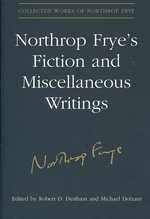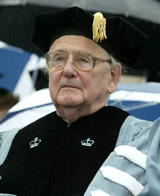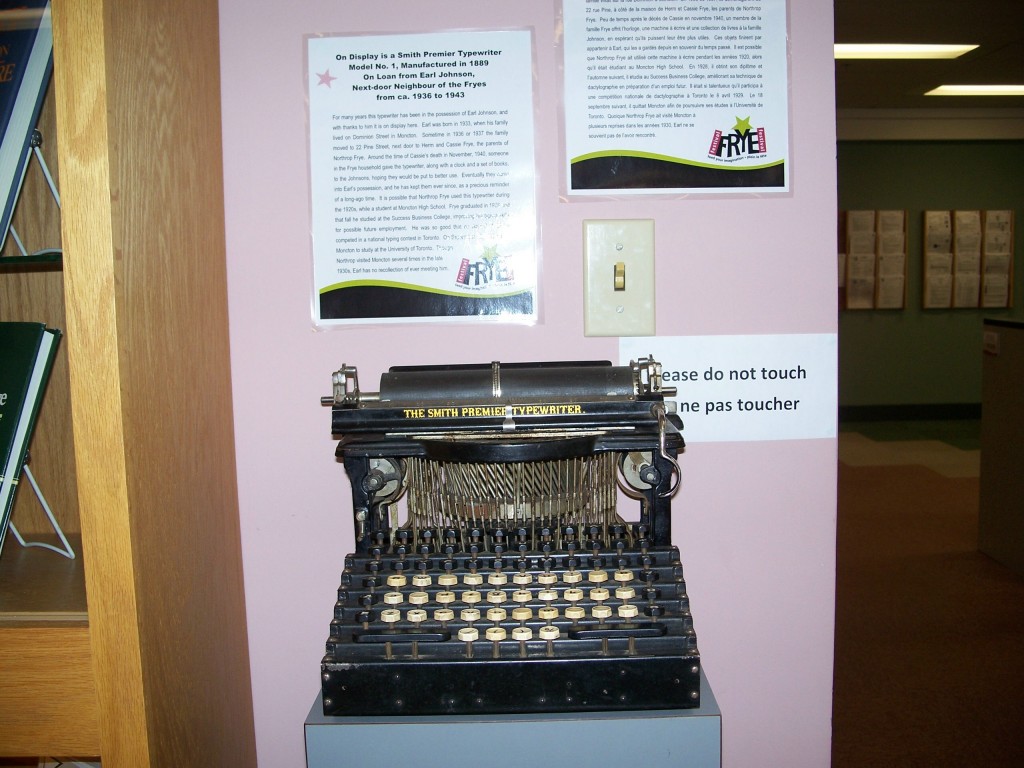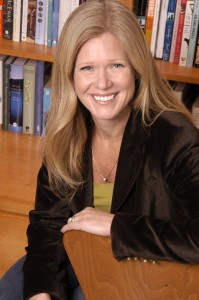B.W. Powe will be speaking at York University on October 21, 5-7 pm: “Apocalypse and Alchemy: Marshall McLuhan and Northrop Frye”
Category Archives: News
The Stewart-Colbert Conspiracy
You really have to ask yourself — with Fox News amping up the lies and the hysteria on a daily basis, with the “mainstream” of the Republican party now so demented that even Karl Rove is muttering nervously about it, and the Teabaggers endorsing a string of totally unqualified (and, one hopes, totally unelectable) candidates for the upcoming midterm elections — would we really have reason enough not to despair without Jon Stewart and Stephen Colbert?
Watch Jon announcing his “Rally to Restore Sanity” here.
Watch Stephen announcing his “March to Keep Fear Alive” here.
They will, of course, be held on the same day, and in all likelihood be incorporated into a single event with the finesse that only Jon and Stephen seem capable of.
It’s at crucial moments like this that the masterly eirons in our midst remind us that no bully is too big not to brought down with a well-aimed blow. (Yes, Glenn, we’re looking at you.)
Frye-Welch Correspondence, 1968-1970
We have posted in the library letters written by Frye to Jane Welch (later Widdicombe) at the beginning of her long tenure as his devoted secretary: she began working for Frye in 1968. Frye’s travels during these three years took him to Ireland and London; Berkeley; Bellagio, Italy; Islamabad, Pakistan; and Merton College, Oxford. During this time he was working on The Critical Path, which, he tells Jane Welch in one of his letters from Merton College, “is the first book since the Anatomy of Criticism that I’ve actually written, i.e., that hasn’t been a series of public lectures. It’s also a very important book. I probably won’t live to see it recognized as such, but you may” (no. 16). Then there are the usual Frye quips, such as “I’m not all that anxious to read the Blake Newsletter, and I never believe anything I see in such things anyway, as a matter of principle” (no. 11), and “A big research library is wasted on me, too bad I never learned to read, and I’m getting itchy feet again” (no. 17).
You can read them all here.
Alberto Manguel: “The Blind Bookkeeper”
httpv://www.youtube.com/watch?v=Y8zyK3DtXxQ
Manguel giving the Fitzi-Continis Lecture, “Borges and the Impossibility of Writing,” at Yale University, February 3, 2010
Toro Magazine has a review of Alberto Manguel‘s The Blind Bookkeeper (or Why Homer Must Be Blind) — an expansion of his Antonine Maillet – Northrop Frye Lecture at this year’s Frye Festival in Moncton — and which begins with Frye’s almost unbelievably prescient unfinished 1943 essay, “The Present Condition of the World” (recently cited here and here).
THE BLIND BOOKKEEPER (or Why Homer Must Be Blind)
By Alberto Manguel
Goose Lane Editions
$14.95
80 pagesPOSTED BY: Salvatore Difalco
Which brings me to the last of my three recommended reads: Alberto Manguel’s elegant bijou of concision, The Blind Bookkeeper, a bilingual transcription of The Antonine Maillet – Northrop Frye Lecture delivered at The University of Moncton by Manguel this past April. An unfinished paper Northrop Frye wrote in 1943 on “the state of the world,” and his ideas of what to expect after the end of the war and the role that literature might play in a time of peace, act as the starting point for Manguel’s moving meditation on the complex and complimentary roles of writer and reader throughout history. Frye’s essay, prescient in 1943, has never been more relevant than today, given the current spiritual and cultural bankruptcy of our neighbours to the south, with their toxic mix of demented evangelism, material superabundance, and pure aggression.
In considering the state of reading and writing today, against the backdrop of ongoing global conflict, Manguel turns to the blind Homer, the archetype of the poet who can see into the future through his knowledge of the past, as inspiration and guide. And with Homer at his side, and Northrop Frye on his heels, he charts a history of war in relation to literature (or, conversely, a history of literature in relation to war). But this overly simplifies what amounts to a stunning tour de force by Manguel. The title of his lecture, hinging on the word bookkeeper, is telling. What´s clear is that Manguel, a bibliophile in every sense of the word, who as a youth in his native Argentina spent four years reading to and hanging out with that meta-bibliophile Jose Louis Borges, loves literature and books, and that love permeates and lights up every sentence.
“Literature is a collaborative effort, not as editors and writing schools will have it, but as readers and writers have known from the very first line of verse ever set down in clay. A poet fashions out of words something that ends with the last full stop and comes to life again with its first reader’s eye. But that eye must be a particular eye, an eye not distracted by baubles and mirrors, concentrated instead on the bodily assimilation of the words, reading both to digest a book and be digested by it. ‘Books,’ Frye once noted, ‘are to be lived in.’” p.27)
Which brings me back to my initial complaint about the length of the books being offered for review this autumn, and how the times, distracted, overburdened, demand, along with relevance, concision. That being said, I’m not against long books, per se, but I do detest being told that these current, bloated offerings, written by relative unknowns, are necessary, groundbreaking, brilliant, and all but worthy of being canonized. Given the entire history of literature, and the existence of Homer, Dante, Shakespeare, Joyce, Borges, et al, publishers and publicists alike should step out from their fairylands, and maybe hire a few competent editors to slough off all the dead skin they’re carrying around.
You
We are doing so well that it exceeds expectation. We have doubled our readership since early March and it continues to rise steadily. By early spring we could expect to get 300 to 400 visits per day on a particularly good string of days. In the last month or so that has increased to 400 to 500 per day. This past week we seem to have broken very decisively through the 500 upper limit and are steadily moving toward 600 visits per day. That translates anywhere between 12,000 to 14,000 visits per month — and from all around the world too. The better news is that we are are still finding our community. These numbers can go still higher, I have no doubt.
So here’s what we’re looking for: byline correspondents who will post for us on a regular basis, whatever “regular” means to you: twice a week, once week, once every two weeks, once a month — or just anytime you’re in the mood and have reason to post. It doesn’t matter how often you post. It only matters that you post.
As you may have noticed I’ve come up with various strategies to ensure the blog portion of the site has daily content, and I (along with a solid core of devotees) try to write a number of posts per week on current events that bring Frye relevantly into play. Which suggests that all of this is engaging enough for our increasing readership. Plus more and more people are searching our more than one thousand archived posts while also delving deep into the Denham library, which is already an extraordinary resource that has only been around for nine months and will continue to grow. We have great plans for it.
The other thing we need therefore are a couple of technically proficient administrators who can work behind the scenes to care for the Denham library. And we definitely need an administrator for the site’s Facebook page to extend our outreach.
Either way, we need more content from more people, and we hope any number of you might come forward. We have a lot of readers. We’d like more of them to become contributors.
Notebook 13: Three Lost Sections Recovered
I am working on three sections from Notebook 13 which I glossed over when Michael Dolzani was editing the Renaissance Notebooks and which then disappeared between the cracks. These include notes on the Alexander lectures, notes for T.S. Eliot, and a series of entries on the imagination. They should have gone into the Miscellany volume.
Here’s one passage I could have used in my various efforts to explain interpenetration:
The conceptual elements of irony include myths of cyclical return, of “entropy,” of the all too human, of the inferno & the “dystopia,” of the assimilation of the human (i.e. the social) to the natural, & of historical myths like those of Vico & Spengler. Comedy has progress & evolution, metamorphosis, providential design, salvation & enlightenment in religion, victorious identifying dialectic in philosophy. Romance, besides the quest, pilgrimage & treasure finding myths in its structure & its conceptual identity by interpenetration, destroys the antithesis of subject & object, time & space, creator & creature. The hunch that the Avatamasaka doctrine of interpenetration is the meaning of romance is just a hunch, but a hunch that is going to work out all right. No hunch that’s been in my mind for twenty years can be wrong. I suppose I might reconsider my idea of calling the lectures the [“Information”?] of Tragedy, etc. Or Spirit – sounds vague and sentimental. Or perhaps just plain “theme.”
We’ll be posting all three recovered sections from Notebook 13 in the library shortly.
Frank Kermode, 1919 – 2010
Our First Anniversary
Today is our first anniversary, and we’re very pleased to be here.
We began celebrating early by posting in its entirety yesterday our beloved benefactor Bob Denham’s first book, Northrop Frye and Critical Method. It has been brilliantly digitized for easy access and reading by Bob’s former student and our current administrator, Jonathan Cox. (Our thanks also to our tech support at McMaster Library, John Fink, for posting it.) You can find it here. You’ll be delighted to see that all chapters, chapter sections, and diagrams have their own links, and there is always a link to the next chapter in the top right hand corner, as well as link to the previous chapter in the top left.
When we started out a year ago we were simply a “weblog dedicated to Northrop Frye.” We’re now much more than that. Besides the daily blog portion of the site (1000 posts in the first 12 months), there is now a journal containing 18 articles that also serves as the archive for Moncton’s Frye Festival.
We have also established the Robert D. Denham Library, which is turning into a singular resource for scholars, students and the reading public. At this point the library houses too many treasures to itemize, but it includes the complete 10 volumes of Bob Denham’s Northrop Frye Newsletter, previously unpublished material by Frye himself (including the remarkable 5 part, 39 chapter Notes on Romance), various reviews of 20 of Frye’s published works, previously unpublished student class notes and exams from the 1940s and 50s, all of Bob Denham’s introductions to various volumes of the Collected Works, study guides and outlines to The Educated Imagination and The Double Vision, two complete books (now including, of course, Bob’s wonderful Frye and Critical Method), various lectures by Frye scholars, and other Frygiana. We hope to be posting audio and video of Frye soon. We also hope that before long we can begin to post student papers and dissertations.
Finally, there is our readership: many hundreds of visits a week and many thousands a month from more than 100 countries around the world. We figure that, as we become better known, those numbers will only improve, as they seem to do steadily from month to month.
We are, of course, eager to tap into the Frye community at large for still more contributions, and our invitation always stands. We are pleased to note that we offered for the first time full day to day coverage of the Frye Festival in Moncton last April, as well as the “Crucified Woman Reborn” conference at Emmanuel College in May. At the moment we are providing coverage of the effort to save the Centre for Comparative Literature at the University of Toronto. If, therefore, you’d like to post at the blog or submit an article to the journal or add something to the library, just drop us a line at fryeblog@gmail.ca
New Frye Display at Moncton Public Library
For many years there’s been a room at the Moncton Public Library called the Northrop Frye room. Various committees of the Frye Festival meet here on occasion, and we feel right at home. Outside the room is a display case containing copies of Frye’s books. This August we’ve added two items to the display: a clock and a typewriter that were originally the property of Frye’s parents. We think it likely that this is the typewriter Frye used during his years at Aberdeen High School, in Moncton. As such, until proven otherwise, it has the look and feel of a relic of the saint (to borrow a phrase from Michael Dolzani).
These items have survived and we have them on display at the library thanks to the care given them over the years by Earl Johnson, who as a young boy in the late 1930s was a next-door neighbour of the Fryes. The library display includes an information sheet explaining Earl’s connection to the Fryes, which I’ve included a copy below.
Earl now lives in Middleton, Nova Scotia. I visited him at his house on July 16, 2010, and brought back the typewriter, the clock, and a set of 6 books, Henry Coppeé’s The Classic and the Beautiful from the Literature of Three Thousand Years. By the Authors and Orators of All Countries. The books were given to Earl’s brother in 1940, with a note inside each book from Mrs. H.E. Frye. Cassie Frye died in November, 1940, and is buried in the Elmwood cemetery in Moncton. (The books will also eventually go into the display case.)
Here is copy of the information sheet included with the library display:
On Display is a Smith Premier Typewriter
Model No. 1, Manufactured in 1889
On Loan from Earl Johnson
Next-door Neighbour of the Fryes
From ca. 1936 to 1943
Earl was born in 1933, when his family lived on Dominion Street in Moncton. Sometime in 1936 or 1937 the family moved to 22 Pine Street, next door to Herm and Cassie Frye, the parents of Northrop Frye. Around the time of Cassie’s death in November, 1940, someone in the Frye household gave the typewriter, along with a clock and a set of books, to the Johnsons, hoping they would be put to better use. Eventually they came into Earl’s possession, and he has kept them ever since, as a precious reminder of a long-ago time. It is possible that Northrop Frye used this typewriter during the 1920s, while a student at Moncton High School. Frye graduated in 1928 and that fall he studied at the Success Business College, improving his typing skills for possible future employment. He was so good that on April 8, 1929 he competed in a national typing contest in Toronto. On September 18, 1929 he left Moncton to study at the University of Toronto. Though Northrop visited Moncton several times in the late 1930s, Earl has no recollection of ever meeting him.
After the jump, a photo of the clock.








